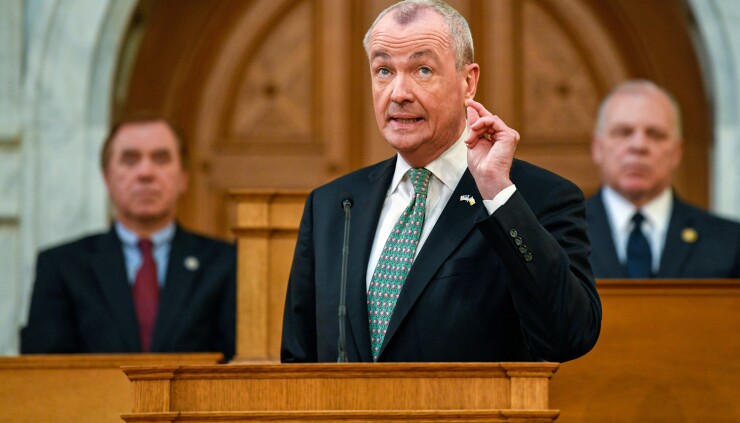A $9.9 billion emergency bonding bill approved by the Democrat-controlled New Jersey legislature Thursday will likely face a legal battle, due to conflicts in the state constitution, before Gov. Phil Murphy can map out the state’s borrowing strategy.
"There are provisions in the constitution that are in conflict," said Marc Pfeiffer, assistant director of Rutgers University’s Bloustein Local Government Research Center.
The

Republican lawmakers announced after the bill's passage that they will file a lawsuit in New Jersey Superior Court over the constitutionality of the
Republicans will have a strong case to stop GO borrowing in New Jersey Superior Court, Pfeiffer said, because of provisions under state law limiting what bond proceeds can be used for in an emergency. While COVID-19 will likely pass muster as an "emergency," he said, the state may be limited by the courts to borrow for pandemic-related costs and not to offset future general fund revenue losses.
“The court will have to determine what the purpose of the emergency spending is,” Pfeiffer said. “One of the key questions will be when does the litigation appear before the courts and will they accept the case quickly before debt is proposed.”
The approved borrowing measure enables the state to bond up to $2.7 billion by the end of the extended 2020 fiscal year on Sept. 30 and $7.2 billion for the shortened 2021 budget cycle from Oct. 1 through June 30. State Treasurer Elizabeth Maher Muoio
“We wouldn’t attach our name to something if we thought it wasn’t completely constitutional and legal,” Murphy said Wednesday during a press briefing.
Pfeiffer said New Jersey should hold off on any decisions to pursue long-term GO bonds until the state gets a clearer revenue picture after the July 15 tax-filing deadline. The Fed’s lending program might prove to a better option for the state and would not hinge on a court decision.
“Issuing permanent debt should be the last option,” Pfeiffer said. “You want to delay things until you absolutely have to do something.”
New Jersey could utilize the Fed’s lending program, without hindering pension contributions, by borrowing up to $1.4 billion from the central bank to be paid off in three years as economic conditions improve, according to a Pew Charitable Trusts analysis published Wednesday. Borrowing from the Fed becomes a better option if the term gets extended to five years from the current three, the report said.
For low-rated states, such as New Jersey, MLF is a viable option despite high borrowing costs, according to Pew. The Garden State’s GO bond ratings are second lowest of all U.S. states ahead of only Illinois due largely to rising pension liabilities. And Illinois has already tapped the MLF.
Fitch Ratings
New Jersey lawmakers adopted a three-month $7.6 billion
“We expect the state's fiscal 2021 budget to provide clues as to the state's willingness to implement ongoing expenditure cuts or revenue increases,” Hitchcock wrote in a report released Thursday. “A budget that relies primarily on large one-time deficit financing could indicate significant credit pressure.”
Murphy said it was “too early to tell" how the borrowing would be structured and will depend how the 2021 fiscal year budget shakes out. The Democrat governor needs to propose an updated nine-month spending plan for Oct. 1 through June 30 by Aug. 25.
All debt issuances under the borrowing legislation are subject to approval by a four-member legislative commission panel that will feature Senate President Steve Sweeney, D-Gloucester, State Sen Paul Sarlo, D-Wood Ridge and two yet-to-be named assembly members.
The bill states that New Jersey's current 6.625% state sales tax and local property taxes would be increased if general budget revenues are insufficient to meet debt service requirements.
New Jersey had $44.4 billion of outstanding bonded debt as of June 30, 2019, according to the state's latest annual





